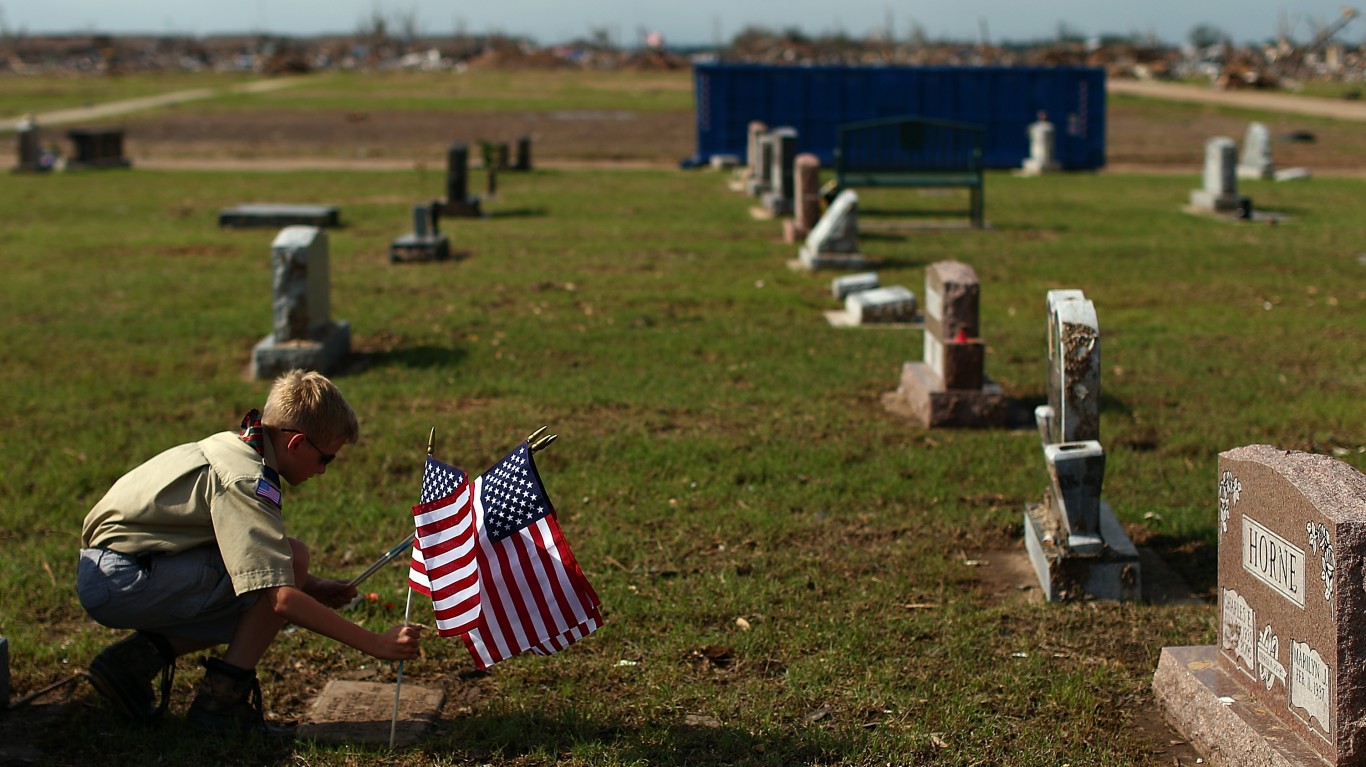
The U.S. Department of Defense is the largest employer in the world, with some 3.2 million people on its books — more than 1.4 million of them on active military duty. (These are the states where the most Americans serve in the military.)
About 200,000 of those service members retire every year, and there are currently an estimated 2.19 million military retirees in the U.S. — a number projected to grow to 2.28 million over the next 10 years. While veterans are entitled to a range of benefits when they leave the service, retirement doesn’t always go smoothly.
To begin with, about 30% of vets nationwide — and 41% of those who have served since Sept. 11, 2001 — have physical disabilities connected with their tours of duty and/or suffer from post-traumatic stress disorder. The difficulty of adjusting to civilian life, an uncertain pandemic-era job market, and the way each state taxes military benefits are other factors affecting them. (Veteran or not, here’s what it costs to retire in every state.)
As if that all weren’t bad enough, state veterans’ homes were among the facilities most drastically affected by COVID-19, and the Veterans Administration recently reported that more than 16,000 former service members have died from the disease.
For a variety of reasons, some states across the country are better places for veterans of the armed services to retire to. To determine the best and worst states for military retirees, 24/7 Wall St. reviewed WalletHub’s list of Best & Worst States for Military Retirees. The site scored states on 30 key metrics, under the overall categories of economic environment, quality of life, and health care, basing their research on a variety of sources including government and non-governmental military websites.
Click here to see the best and worst states for military retirees
Among the specific considerations of the study were each state’s tax-friendliness, share of veteran-owned businesses, VA expenditures, housing affordability, share of veterans not receiving SNAP, share of homeless veterans, weather, physicians per capita, mental health counselors per capita, and COVID-19 positive tests per capita in the week previous to the study.
Virginia was ranked as the best place for military retirees overall, with a score of 61/100. Surprisingly, Oregon was at the bottom of the list, at 37.8/100. Its neighbor, Washington, got the lowest score for health care, while the highest honors in that category went to Connecticut.

50. Oregon
> Score: 37.8/100
> Economic environment rank: 21st worst
> Quality of life rank: the worst
> Health care rank: 6th worst
[in-text-ad]

49. Vermont
> Score: 38.4/100
> Economic environment rank: the worst
> Quality of life rank: 19th worst
> Health care rank: 12th worst

48. Nevada
> Score: 41.5/100
> Economic environment rank: 12th worst
> Quality of life rank: 5th worst
> Health care rank: 7th worst
47. Rhode Island
> Score: 42.7/100
> Economic environment rank: 11th worst
> Quality of life rank: 6th worst
> Health care rank: 9th worst
[in-text-ad-2]

46. Washington
> Score: 43.3/100
> Economic environment rank: 19th worst
> Quality of life rank: 17th worst
> Health care rank: the worst

45. Michigan
> Score: 43.3/100
> Economic environment rank: 4th worst
> Quality of life rank: 7th worst
> Health care rank: 14th best
[in-text-ad]
44. New York
> Score: 44.3/100
> Economic environment rank: 3rd worst
> Quality of life rank: 3rd worst
> Health care rank: 3rd best

43. Indiana
> Score: 44.3/100
> Economic environment rank: 13th worst
> Quality of life rank: 9th worst
> Health care rank: 19th worst

42. Hawaii
> Score: 45.3/100
> Economic environment rank: 5th worst
> Quality of life rank: 18th best
> Health care rank: 20th worst
[in-text-ad-2]

41. Iowa
> Score: 46.2/100
> Economic environment rank: 9th worst
> Quality of life rank: 16th worst
> Health care rank: 21st worst

40. Colorado
> Score: 46.2/100
> Economic environment rank: 18th worst
> Quality of life rank: 22nd best
> Health care rank: 3rd worst
[in-text-ad]

39. California
> Score: 46.7/100
> Economic environment rank: 2nd worst
> Quality of life rank: 9th best
> Health care rank: 10th best

38. Ohio
> Score: 46.9/100
> Economic environment rank: 6th worst
> Quality of life rank: 10th worst
> Health care rank: 7th best
37. Illinois
> Score: 47.1/100
> Economic environment rank: 15th worst
> Quality of life rank: 8th worst
> Health care rank: 18th best
[in-text-ad-2]

36. Delaware
> Score: 47.3/100
> Economic environment rank: 8th worst
> Quality of life rank: 11th best
> Health care rank: 13th worst

35. Mississippi
> Score: 47.5/100
> Economic environment rank: 24th best
> Quality of life rank: 18th worst
> Health care rank: 5th worst
[in-text-ad]

34. Tennessee
> Score: 48.3/100
> Economic environment rank: 6th best
> Quality of life rank: 4th worst
> Health care rank: 10th worst

33. New Mexico
> Score: 48.4/100
> Economic environment rank: 20th worst
> Quality of life rank: 25th worst
> Health care rank: 16th worst

32. New Jersey
> Score: 48.6/100
> Economic environment rank: 7th worst
> Quality of life rank: 16th best
> Health care rank: 17th best
[in-text-ad-2]

31. Nebraska
> Score: 48.7/100
> Economic environment rank: 23rd worst
> Quality of life rank: 21st best
> Health care rank: 11th worst

30. Kentucky
> Score: 49.2/100
> Economic environment rank: 25th worst
> Quality of life rank: 13th worst
> Health care rank: 25th best
[in-text-ad]

29. Utah
> Score: 49.4/100
> Economic environment rank: 10th best
> Quality of life rank: 20th worst
> Health care rank: 2nd worst
28. Massachusetts
> Score: 49.5/100
> Economic environment rank: 23rd best
> Quality of life rank: 2nd worst
> Health care rank: 6th best

27. Louisiana
> Score: 49.9/100
> Economic environment rank: 17th worst
> Quality of life rank: 25th best
> Health care rank: 23rd best
[in-text-ad-2]

26. Arizona
> Score: 50/100
> Economic environment rank: 16th worst
> Quality of life rank: 8th best
> Health care rank: 14th worst

25. Maine
> Score: 50.4/100
> Economic environment rank: 17th best
> Quality of life rank: 23rd best
> Health care rank: 8th worst
[in-text-ad]

24. Pennsylvania
> Score: 50.6/100
> Economic environment rank: 14th worst
> Quality of life rank: 11th worst
> Health care rank: 2nd best

23. North Carolina
> Score: 51.9/100
> Economic environment rank: 24th worst
> Quality of life rank: 12th best
> Health care rank: 25th worst

22. Connecticut
> Score: 52.3/100
> Economic environment rank: 10th worst
> Quality of life rank: 24th worst
> Health care rank: the best
[in-text-ad-2]
21. Texas
> Score: 52.7/100
> Economic environment rank: 11th best
> Quality of life rank: 14th worst
> Health care rank: 24th best

20. Wisconsin
> Score: 52.9/100
> Economic environment rank: 22nd worst
> Quality of life rank: 23rd worst
> Health care rank: 8th best
[in-text-ad]

19. Georgia
> Score: 53.2/100
> Economic environment rank: 8th best
> Quality of life rank: 19th best
> Health care rank: 17th worst
18. North Dakota
> Score: 53.6/100
> Economic environment rank: 12th best
> Quality of life rank: 22nd worst
> Health care rank: 24th worst
17. West Virginia
> Score: 53.9/100
> Economic environment rank: 4th best
> Quality of life rank: 12th worst
> Health care rank: 20th best
[in-text-ad-2]

16. Oklahoma
> Score: 54.1/100
> Economic environment rank: 18th best
> Quality of life rank: 6th best
> Health care rank: 15th worst
15. Arkansas
> Score: 54.2/100
> Economic environment rank: 9th best
> Quality of life rank: 21st worst
> Health care rank: 21st best
[in-text-ad]

14. Montana
> Score: 54.4/100
> Economic environment rank: 19th best
> Quality of life rank: 13th best
> Health care rank: 19th best

13. Minnesota
> Score: 54.4/100
> Economic environment rank: 21st best
> Quality of life rank: 15th worst
> Health care rank: 5th best
12. Idaho
> Score: 54.4/100
> Economic environment rank: 20th best
> Quality of life rank: 14th best
> Health care rank: 15th best
[in-text-ad-2]

11. Kansas
> Score: 54.5/100
> Economic environment rank: 22nd best
> Quality of life rank: 20th best
> Health care rank: 9th best

10. New Hampshire
> Score: 55.4/100
> Economic environment rank: 13th best
> Quality of life rank: 10th best
> Health care rank: 22nd worst
[in-text-ad]

9. Missouri
> Score: 55.7/100
> Economic environment rank: 16th best
> Quality of life rank: 15th best
> Health care rank: 11th best

8. Wyoming
> Score: 55.9/100
> Economic environment rank: 7th best
> Quality of life rank: 3rd best
> Health care rank: 4th worst

7. Maryland
> Score: 57/100
> Economic environment rank: 25th best
> Quality of life rank: the best
> Health care rank: 23rd worst
[in-text-ad-2]

6. Alabama
> Score: 57.2/100
> Economic environment rank: 2nd best
> Quality of life rank: 17th best
> Health care rank: 22nd best

5. Alaska
> Score: 58.3/100
> Economic environment rank: the best
> Quality of life rank: 7th best
> Health care rank: 18th worst
[in-text-ad]

4. South Dakota
> Score: 59.8/100
> Economic environment rank: 3rd best
> Quality of life rank: 24th best
> Health care rank: 4th best

3. Florida
> Score: 59.9/100
> Economic environment rank: 15th best
> Quality of life rank: 4th best
> Health care rank:13th best

2. South Carolina
> Score: 59.9/100
> Economic environment rank: 14th best
> Quality of life rank: 2nd best
> Health care rank: 16th best
[in-text-ad-2]

1. Virginia
> Score: 61/100
> Economic environment rank: 5th best
> Quality of life rank: 5th best
> Health care rank: 12th best
100 Million Americans Are Missing This Crucial Retirement Tool
The thought of burdening your family with a financial disaster is most Americans’ nightmare. However, recent studies show that over 100 million Americans still don’t have proper life insurance in the event they pass away.
Life insurance can bring peace of mind – ensuring your loved ones are safeguarded against unforeseen expenses and debts. With premiums often lower than expected and a variety of plans tailored to different life stages and health conditions, securing a policy is more accessible than ever.
A quick, no-obligation quote can provide valuable insight into what’s available and what might best suit your family’s needs. Life insurance is a simple step you can take today to help secure peace of mind for your loved ones tomorrow.
Click here to learn how to get a quote in just a few minutes.
Thank you for reading! Have some feedback for us?
Contact the 24/7 Wall St. editorial team.
 24/7 Wall St.
24/7 Wall St.

 24/7 Wall St.
24/7 Wall St. 24/7 Wall St.
24/7 Wall St.






 24/7 Wall St.
24/7 Wall St.